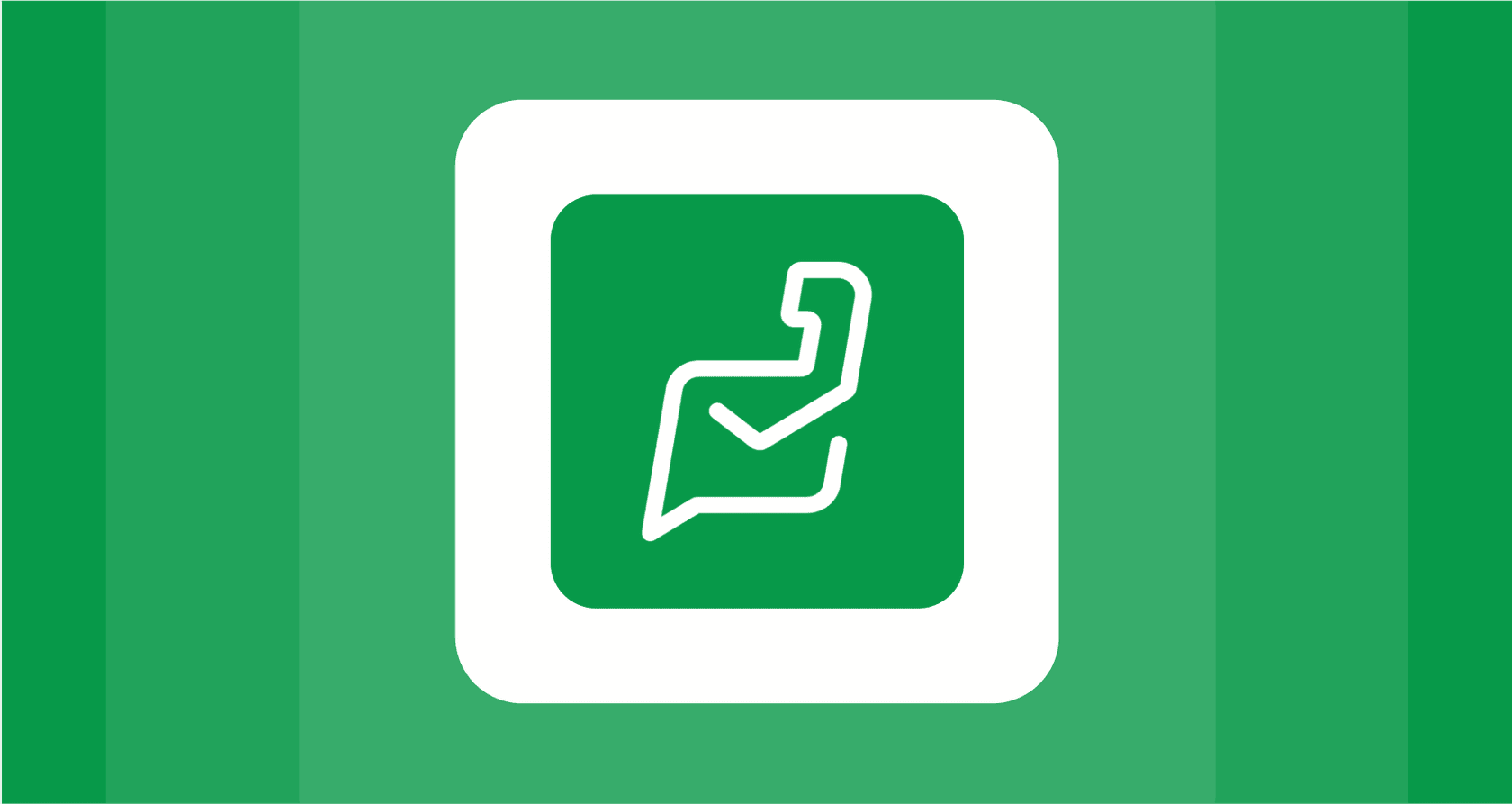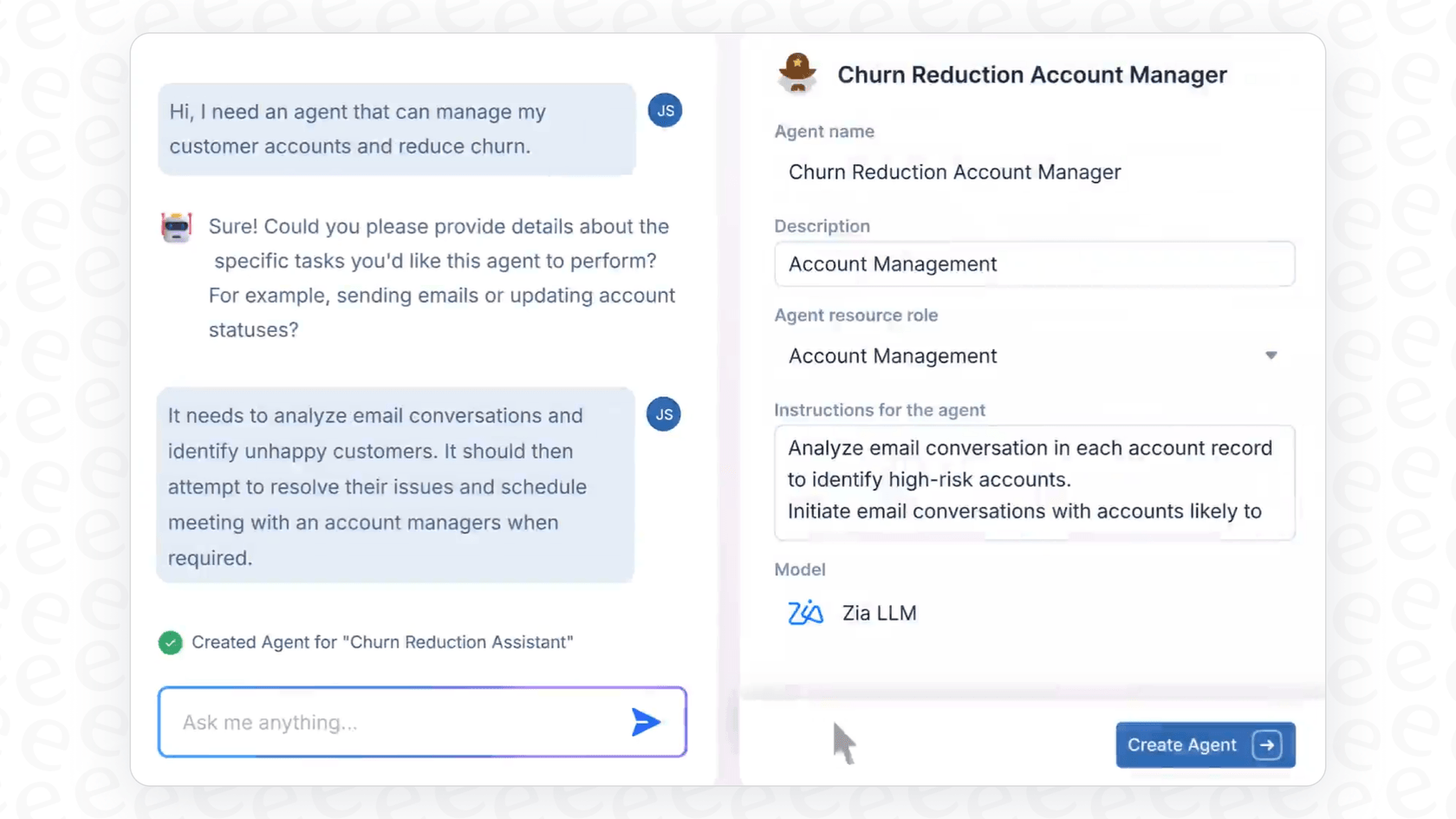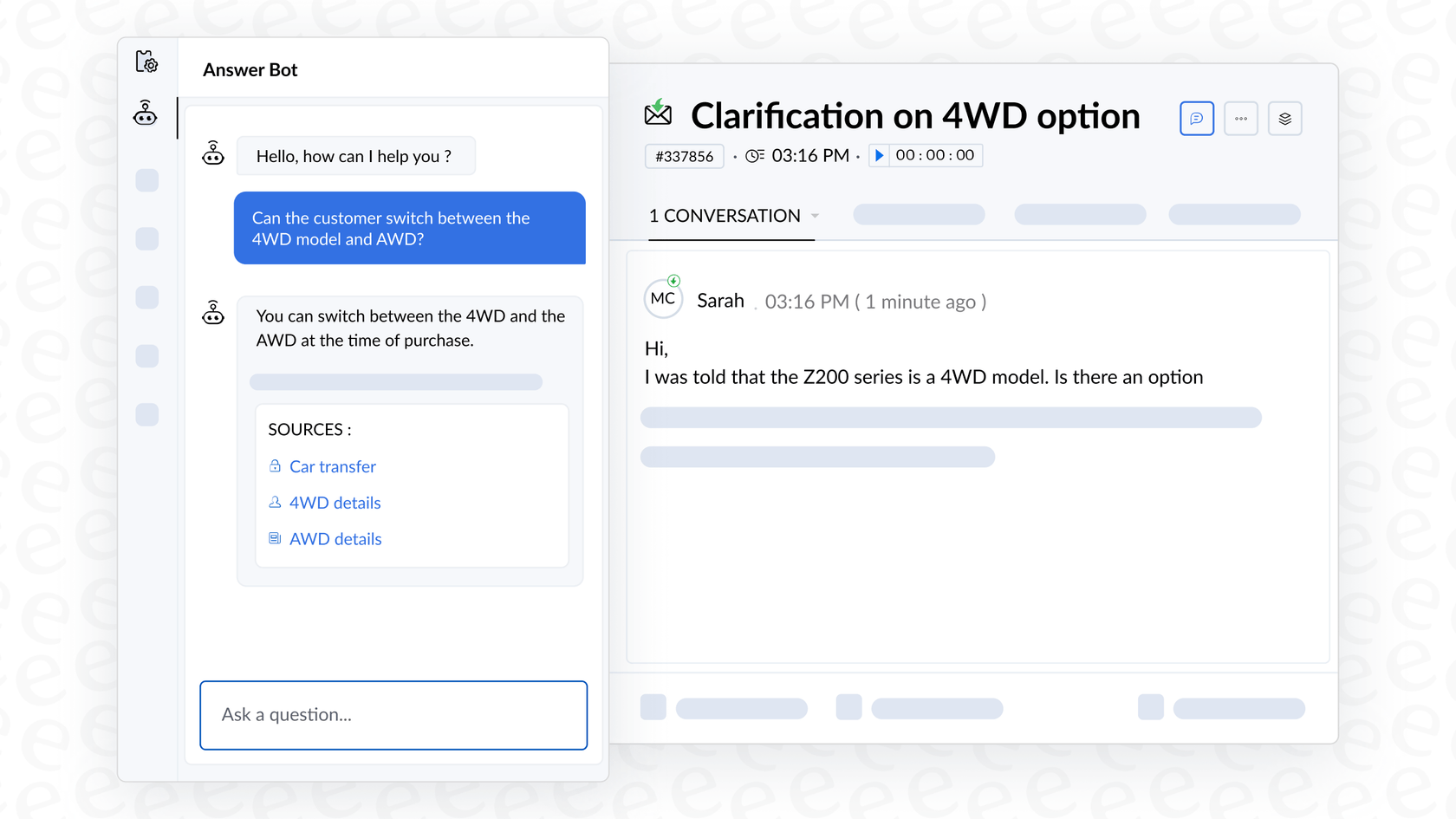A deep dive into Zoho Desk Zia agent autonomy: Features, limits, and alternatives

Stevia Putri

Katelin Teen
Last edited November 23, 2025
Expert Verified

The hype around AI in customer support has moved way beyond just suggesting replies. We're now talking about fully autonomous AI agents that can handle entire conversations, manage tickets, and solve problems without a human ever stepping in. For teams looking to scale, that sounds pretty great.
Zoho has entered the ring with its revamped Zia AI platform for Zoho Desk, promising this exact kind of agent autonomy. But what does that actually look like for your day-to-day support operations?
This guide will give you a clear, no-fluff look at Zoho Desk Zia Agent Autonomy. We'll break down what it is, what it can do, how much it costs, and, maybe most importantly, where it falls short. By the end, you'll have a much better sense of whether it’s the right tool for your team or if a more flexible approach makes more sense.
What are Zoho Desk and Zoho Zia?
First things first, let's clear up the names. It’s easy to get lost in the product suite, so here’s a quick primer.
What is Zoho Desk?
Zoho Desk is a cloud-based help desk software. It’s designed to pull all your customer conversations from email, social media, chat, and web forms into one central hub. It’s a capable ticketing system and a piece of the much larger Zoho ecosystem, which has apps for just about everything from CRM to finance.

What is Zoho Zia?
Zia is Zoho's long-standing AI assistant. For a while, it worked mostly in the background, doing things like guessing a ticket's sentiment or suggesting knowledge base articles. But recently, Zoho has given it a major upgrade, turning it into a full-blown platform for "agentic AI."
So, what’s "agentic AI"? It's the difference between an AI that helps a human and one that can act on its own. Instead of just drafting a reply for an agent to approve, an autonomous agent can understand a customer's problem, figure out the best way to solve it, and see it through to the end.

This new platform is built on three main components:
-
Zia Agents: These are basically pre-built AI "employees" made for specific jobs like support, sales, or HR.
-
Zia Agent Studio: This is a low-code tool where you can build your own custom agents.
-
Agent Marketplace: A spot to find and use agents built by Zoho or other partners.
In short, Zoho is trying to turn Zia from a helpful sidekick into a digital workforce you can deploy across your company.
Understanding the architecture behind Zoho Desk Zia Agent Autonomy
To really get what Zoho is offering, you have to see how these parts connect. It’s not a single feature but a whole framework for building and using AI.
Zia Agents: The pre-built digital workforce
Think of Zia Agents as ready-to-go digital employees. Zoho provides several pre-built ones for Zoho Desk, like a "Support Specialist" that handles common questions or a "Resolution Expert" that digs through old tickets for context.
The main upside here is convenience. You can turn these agents on without having to build anything yourself. The catch is that they're designed to work within Zoho's world, so your ability to customize them is pretty limited. You're playing by their rules.
Zia Agent Studio: The low-code customization engine
If the pre-built agents don't quite cut it, Zoho offers the Zia Agent Studio. It’s a low-code/no-code space where you can design your own agents from scratch. You can tell them what to do, what information to use, and what actions they can take inside Zoho's apps.
But even though "low-code" sounds easy, building an effective autonomous agent is more than a simple drag-and-drop exercise. You need a solid grasp of the Zoho ecosystem, its data, and its workflow logic. For a busy support manager who isn't a developer, this can quickly turn into a time-consuming project with a steep learning curve.

Agent Marketplace: A distribution hub
The Agent Marketplace is where you can grab pre-built agents from Zoho and, down the line, its partners. It’s intended to be a hub for finding new ways to automate your work.
This whole setup, from the Studio to the pre-built Agents, points to a powerful but fairly complex, developer-focused system. It’s a different philosophy from modern platforms like eesel AI, which are built specifically for support managers to use themselves. With a tool like eesel AI, you can connect your helpdesk, train your AI, and launch automations in an afternoon, all without writing code or sitting through weeks of training.
Key features and use cases for Zoho Desk Zia Agent Autonomy
Alright, so what can this new autonomous Zia actually do for a support team using Zoho Desk? Let's get into the practical side of things.
Autonomous ticket handling and resolution
This is the big one. Zia can now manage tickets from start to finish. Its Answer Bot can use your knowledge base to give instant, direct answers to customers on your website or through chat.

Beyond just answering questions, Zia can also read incoming tickets, understand the customer's mood, and automatically add the right tags. This helps get tickets to the right person or department without someone having to manually sort through the queue.
Generative AI for agent assistance
For tickets that still need a human, Zia has a bunch of generative AI tools to make agents' lives easier. It can:
-
Summarize long, messy ticket threads into a few key points.
-
Analyze a customer's tone so agents can adjust their own.
-
Draft personalized replies based on the conversation so far.
-
Find similar past tickets so agents can see how a problem was fixed before.
Knowledge base management
One of Zia's smarter features is its ability to help you grow your knowledge base. It can look at resolved tickets and automatically draft help center articles based on the conversation. This is a neat way to spot and fill gaps in your documentation with content that you already know is useful.
Here’s a quick summary of the main pre-built Zia Agents for Zoho Desk:
| Agent Name | Primary Function | Key Capabilities | Best For |
|---|---|---|---|
| Support Specialist | Frontline Resolution | Understands customer concerns, analyzes sentiment, drafts empathetic responses from your KB. | Instantly answering common customer questions. |
| Resolution Expert | Contextual Analysis | Analyzes past tickets, summarizes resolution steps, and logs details for future reference. | Giving agents historical context for tricky issues. |
| Sentiment Analyst | Churn Prevention | Tracks customer sentiment over time and flags teams when a customer seems unhappy. | Proactively identifying and helping at-risk customers. |
| Quality Manager | Response Quality | Analyzes agent responses in real-time and offers feedback on quality and tone. | Training new agents and keeping support standards high. |
The real cost of Zoho Desk Zia Agent Autonomy: Limitations and pricing
On the surface, Zoho's AI package looks pretty complete. But once you start digging, you’ll find some major limitations and hidden costs.
Limitation 1: You’re locked into the Zoho world
Zia's biggest strength is also its greatest weakness: it's built to work almost exclusively inside the Zoho ecosystem. It’s great at pulling information from Zoho Desk, Zoho CRM, and other Zoho apps. But what about all the important knowledge your team keeps outside of Zoho?
Most companies have documentation scattered across tools like Google Docs, Confluence, Notion, and Slack. Zia has a tough time connecting to these external sources, which means your AI agent is flying blind, operating with only a fraction of the necessary information. A truly helpful AI needs to learn from all of your company's knowledge. This is a big reason why tools like eesel AI exist; they instantly and securely connect to over 100 sources to give your AI the full picture.

Limitation 2: The complexity of going truly autonomous
Building custom workflows in the Zia Agent Studio isn't as simple as it sounds. While it's marketed as low-code, creating autonomous agents that can handle messy, real-world problems takes a lot of setup, testing, and upkeep. You’ll probably need a developer or a technical person on your team to make it work well.
This is a far cry from the setup process of a tool like eesel AI. There, you can connect your helpdesk, train the AI on all your past tickets, and run a full simulation on historical data to see exactly how it would have performed. You get to see the results in a risk-free environment, often in a single afternoon. You know the ROI before you even flip the switch.
Limitation 3: The best features are behind a paywall
This is the kicker. The most powerful autonomous AI features, like the Answer Bot and the advanced Zia Agents, are only available on Zoho Desk's most expensive Enterprise plan.
This effectively locks small to mid-sized teams out of true automation unless they're ready to make a serious financial leap. You can't just test the best features to see if they work for you; you have to pay a premium for the plan first.
Zoho Desk pricing
Let's look at the plans to see where the AI features live.
-
Standard ($14/user/month, billed annually): You get some basic generative AI help, but you have to bring your own OpenAI API key. The core autonomous features are missing.
-
Professional ($23/user/month, billed annually): This adds more automation rules but still no Answer Bot or advanced Zia functions.
-
Enterprise ($40/user/month, billed annually): This is the one you need for the good stuff. It includes the Answer Bot and the full Zia AI suite that powers the autonomous agents, auto-tagging, and sentiment analysis.
That $40 per agent, per month price tag adds up quickly, especially if you have a decent-sized team. It's a steep cost just to unlock the AI tools. It's also worth pointing out that this per-agent model is quite different from eesel AI's transparent pricing, which is based on usage (how many AI interactions you have), not the number of agents on your team. With a usage-based model, you get predictable costs and you're not penalized for hiring more support agents.

Is Zoho Desk Zia Agent Autonomy the future of support?
Zoho is clearly serious about building out Zoho Desk Zia Agent Autonomy, and for teams that are already deep in the Zoho ecosystem, it brings some powerful new tools to the table. The pre-built agents and AI assistance can certainly help streamline some tasks.
However, the platform comes with some significant trade-offs. The vendor lock-in means your AI will probably be missing key information from your other tools. The complexity of the Agent Studio makes true customization a challenge for non-technical teams. And maybe most importantly, locking the best features behind the priciest plan makes it an expensive gamble.
While impressive inside its own bubble, Zoho Desk Zia Agent Autonomy might not be the best choice for modern teams that need flexibility, simplicity, and a unified view of knowledge from all their tools.
For businesses that want powerful, self-serve AI that plugs into their entire tech stack, not just one vendor's, it’s worth looking at other options. eesel AI offers a radically simpler way to launch autonomous agents that learn from everything, let you simulate their performance with confidence, and can go live in minutes, not months. You can see how it works today.
Frequently asked questions
Zoho Desk Zia Agent Autonomy refers to Zoho's revamped AI platform that enables AI agents to handle entire customer support conversations and tasks independently, without constant human intervention. It represents a shift from AI assisting humans to AI acting autonomously to solve problems and manage tickets.
Zoho Desk Zia Agent Autonomy is deeply integrated with Zoho's suite of products, including Zoho Desk and Zoho CRM. It leverages Zia Agents (pre-built or custom) and the Zia Agent Studio to create AI workflows that can access and utilize data primarily within Zoho applications.
Practical use cases for Zoho Desk Zia Agent Autonomy include autonomous ticket handling and resolution using an Answer Bot, generative AI assistance for human agents (like summarization or drafting replies), and intelligent knowledge base management by drafting articles from resolved tickets.
The key limitations of Zoho Desk Zia Agent Autonomy include its strong vendor lock-in to the Zoho ecosystem, making it difficult to access external knowledge sources. Additionally, building truly autonomous agents can be complex and may require technical expertise, despite being marketed as low-code.
The full capabilities of Zoho Desk Zia Agent Autonomy, including the Answer Bot and advanced Zia AI suite, are primarily available on the most expensive Enterprise plan. Lower-tier plans offer more basic generative AI features, often requiring your own API key.
One of the main limitations is that Zoho Desk Zia Agent Autonomy struggles to connect with external knowledge sources outside the Zoho ecosystem, such as Google Docs, Confluence, or Slack. This means the AI may operate with incomplete information, limiting its effectiveness.
Share this post

Article by
Stevia Putri
Stevia Putri is a marketing generalist at eesel AI, where she helps turn powerful AI tools into stories that resonate. She’s driven by curiosity, clarity, and the human side of technology.





